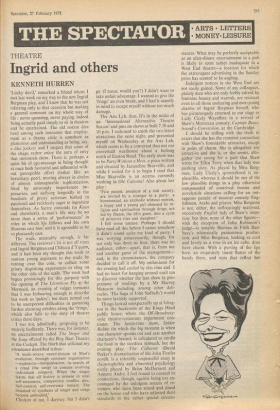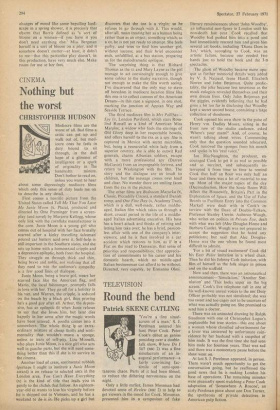• ARTS • LETTERS • MONEY. LEISURE THEATRE
Ingrid and others
KENNETH HURREN
`Lucky devil,' remarked a friend whom I met last week on my way to the new Ingrid Bergman play, and I knew that he was not referring only to that occasion but making a general comment on my whole way of life: never queueing, never paying, indeed being actually paid simply to sit in theatres and be entertained. The old notion dies hard among such innocents that employ- ment as a drama critic is somehow as glamorous and undemanding as being, say, a disc jockey; and I suspect that some of the chaps rather enjoy the aura of envy that surrounds them. There is, perhaps, a quiet bit of ego-massage in being thought at once both favoured and influential with- out perceptible effort (rather like an hereditary peer), moving always in circles of almost unimaginable sophistication, feted by amusingly importunate im- presarios, and dallying languidly in the boudoirs of pretty actresses bathed in patchouli and recklessly eager to ingratiate themselves. As Sartre contends (in Kean and elsewhere), a man's life may be no more than a series of `performances' in roles in which his fellows and his own illusions cast him, and it is agreeable to be so pleasantly cast. The truth, miserably enough, is far different. The reviewer's lot is not all roses and Ingrid Bergman and Château d'Yquem, and it had been my thought this week to caution young aspirants to the trade by turning over the coin, to collect some grimly dispiriting experiences to sling on the other side of the scale. The week had begun promisingly for this purpose with the opening of The Licentious Fly at the Mermaid, an evening of vulgar torments that I was forbearing enough to describe last week as 'paltry'; but there turned out to be unexpected difficulties in garnering further alarming exhibits along the `fringe,' which also falls to the duty of theatre critics these days.
I Was not, admittedly, proposing to be entirely foolhardy. There was, for instance, an entertainment called The Singer and the Song offered by the Roy Hart Theatre at the Cockpit. The blurb that solicited my attendance described it thus:
'A multi-octave sound-picture of Man's evolution, through constant organisation —explosion—reorganisation, in search of a creed (the song) to contain evolving individuals (singers). When the singer learns that all history is present in total self-awareness, competitive conflict dies. Self-control, self-reverence remain. The dreamed of synthesis of singer and songs become embodied,' Chicken of me, I daresay, but I didn't go. (I mean, would you?) I didn't want to take unfair advantage. I wanted to give the `fringe' an even break, and I had it cannily in mind to escape myself without too much damage.
The Arts Lab, then. It's in the midst of an `International Alternative Theatre Season' and puts on shows at both 7.30 and 10 p.m. I reckoned to catch the two latest attractions the same night, and presented myself on Wednesday at the Arts Lab, which seems to be a converted (but not too converted) warehouse about a furlong north of Euston Road. The early show was to be Party Without a Host, a piece written and directed by Jacqueline Skarvellis, and while I waited for it to begin I read that Miss Skarvellis is an actress currently working in Oh! Calcutta! Also about her play:
'Five people, products of a sick society, are invited by a stranger to a party: a homosexual, an alcoholic without morals, a hippy and a young girl obsessed by re- ligion and spiritualism through drugs, are led •by Dante, the fifth guest, into a cycle of primitive rites and slaughter.'
I felt some unease. Perhaps I should have read all this before I came; somehow it didn't sound quite my kind of party. I was worying unnecessarily, though, for not only was there no host, there was no audience, either—apart, that is, from me and another guest of the management— and, in the circumstances, the company decided to call it off. My enthusiasm for the evening had cooled by this time and I had no heart for hanging around until ten to discover whether the late show (a pro- gramme of readings by a Mr Harvey Matusow including, among other deli- cacies, `The Saga of John Sadballs') would be more lavishly supported.
Things looked unexpectedly up at Isling- ton in the backroom of the Kings Head public house, where the Off-Broadway- style theatre-restaurant experiment con- tinues. The lunch-time show, Spider Rabbit (in which the big moment is when one character spoons out and eats another character's brains), is calculated to curdle the food in the sturdiest stomach, but the evening play, The Collector (David Parker's dramatisation of the John Fowles novel), is a tolerably suspenseful essay in claustrophobia and abnormal psychology nicely played by Brian McDermott and Annette Andre. I feel bound to counsel its connections, though, against being too en- couraged by the indulgent notices of re- viewers who have been wined and dined on the house and who have adjusted their standards to the rather special circum- stances. What may be perfectly acceptable as an after-dinner entertainment in a pub is likely to seem rather inadequate in a West End theatre—a location for which the extravagant advertising in the Sunday press has seemed to be angling.
Indulgent notices in the West End are not easily gained. Some of my colleagues, plainly men who are only feebly stirred by feminine beauty and warmth, are resistant even to all those endearing and ever-young charms of Ingrid Bergman herself, who has picturesquely returned to our stage as Lady Cicely Waynflete in a revival of Shaw's Moroccan comedy, Captain Brass- bound's Conversion, at the Cambridge.
I should be trifling with the truth to assert that she has the remotest connection with Shaw's formidable aristocrat, except in point of charm. She is altogether too attractive and she is, or she seems, alto- gether too young for a part that Shaw wrote for Ellen Terry when that lady was pushing sixty. As played by Miss Berg- man, Lady Cicely's spinsterhood is im- plausible, whereas it should be one of the few plausible things in a play otherwise compounded of contrived ironies and novelettish situations calling for an out- rageous parade of musical comedy Eng- lishmen, Arabs and pirates. Miss Bergnmn is not, either, the suffocatingly maternal, excessively English lady of Shaw's inten- tion; but then, none of the other figures-- with the exception of John Robinson's judge—is notably Shavian in Frith Ban- bury's whimsically pantomimic produc- tion, and Miss Bergman, looking as cool and lovely as a rose in an ice cube, does have charm. With a pursing of the lips here, an exquisitely timed flutter of the hands there, and eyes that reflect her
changes of mood like some beguiling land- scape in a spring shower, it is precisely that charm that Barrie defined as 'a sort of bloom on a woman—if you have it you don't need anything else.' Miss Bergman herself is a sort of bloom on a play, and it somehow doesn't matter—at least, it didn't to me—that this particular play doesn't, in this production, have very much else. Make room for me at her feet.



































 Previous page
Previous page